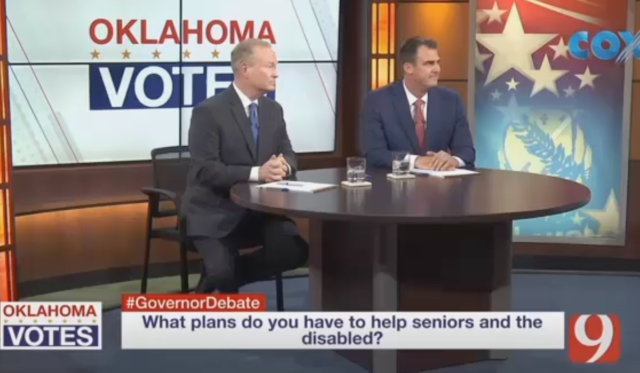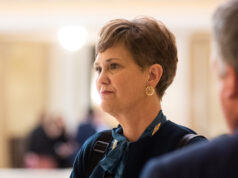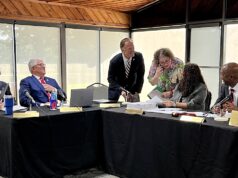

At times, Tuesday night’s GOP gubernatorial runoff debate felt like a dystopian Tom Stoppard play in which none of the characters on stage acknowledge each other.
While TV cameras have a way of sucking all the air and humanity out of a room, former Oklahoma City Mayor Mick Cornett and Tulsa mortgage mogul Kevin Stitt avoided answering various questions with the wheedling whimsy of a college student trying to pass classes without reading course materials.
As I watched the debate from a bar stool at The Union — 616 N.W. 5th St. — I pondered the passive inquisition of Griffin Communications moderators Kelly Ogle and Terry Hood, remembering an old journalism mantra: If a question is worth asking once, ask it twice if you don’t get an answer the first time.
Furthermore, I wondered why neither Stitt nor Cornett seemed interested in discussing his competitor, even though their seats were close enough to goose one another under the table, had either been inclined.
Questions not really answered
Ogle and Hood asked important questions of the two Republican gubernatorial hopefuls Tuesday night, but too often the candidates avoided answering the questions directly, even when they were “Yes” or “No” in nature.
Unfortunately, neither TV anchor pressed the candidates to answer what had been asked. Ogle’s question about the Legislature’s historic 2018 revenue package — including tax hikes on cigarettes, fuel and oil and gas drilling — should have yielded some daylight between Stitt and Cornett.
“Is raising taxes on these kinds of goods the right way to pay for teacher raises or to solve other budget problems that the state is facing?” Ogle asked.
Stitt responded first, discussing a need for competitive salaries before answering Ogle’s question.
“But I said I wasn’t for the tax increase because I was looking at the economy, and it was coming back,” he said. “So I’m not for new taxes.”
When it was Cornett’s turn to say whether he believed the tax package was appropriate, he hammered his primary message out of the gate: “If you take a look at what we’ve accomplished in Oklahoma City….”
While he mentioned that OKC passed 14 budgets during his time as mayor and that he has “been the chair of the audit committee in Oklahoma City,” Cornett never stated his thoughts on the Legislature’s revenue raising.
“We’ve got to have a better process and we’ve got to have someone who has brought in a budget before,” he said, declining to speak positively on the teacher-pay package as he has previously.
Similarly, Hood’s question about medical marijuana yielded equally obtuse answers.
“Do you think lawmakers need to amend any part of State Question 788?” Hood asked.
Cornett went first, saying he is “all for medical marijuana” if it is for its intended use. But he said he “opposed” SQ 788 because he believed it would have “unintended consequences.”
“Right now, you see the Health Department struggling to try and put something into effect, and obviously this is going to be a major issue when the Legislature convenes next year,” he added, without saying whether he believed the marijuana statutes should be amended.
Stitt answered similarly, saying people rightfully have concerns.
“The problem that I had was unelected bureaucrats changing the will of the people,” he said. “I applaud them for going back to the will of the people on that one.”
Shots not fired
Across a myriad of topics discussed in Tuesday night’s debate, Cornett and Stitt managed to avoid any major disagreement. Both candidates stayed sternly positive in their messaging, with Cornett talking about Oklahoma City’s economy, hyping the beauty of Tulsa and saying he recently ate “the best theta burger of my life.”
Stitt praised Oklahoma’s natural resources multiple times and said “we’ve got the farming” in Western Oklahoma.
Thirty-six minutes into the hour-long debate, Stitt was the first candidate to refer to his opponent while answering a question about how aggressive he would be in regard to auditing state agencies.
“This is a big distinction between me and my opponent. We have got to have performance metrics,” Stitt said.
Aside from that, however, the pair virtually ignored one another, choosing instead to stick to a game plan of articulating original visions.
Even when Stitt was asked about the regulatory actions taken against his mortgage company in other states, Cornett did not jump in to paint the businessman as “shady” like a previous opponent had. But even had he wanted to, Cornett was awkwardly not granted time to speak on that question, just as Stitt was not given time to speak on a question to Cornett about tribal gaming compacts.
After the candidates’ closing statements, however, the moderators said there was time for an additional question about what sets the two men apart.
“I think it’s my success record as the mayor of Oklahoma City,” Cornett said. “I understand how government can work to benefit its citizens.”
Stitt replied: “It’s an outsider vs. an insider. I’ve never been in politics before going against somebody who has been doing it their whole career.”
Edmondson and Libertarians
At the debate’s conclusion, moderators noted that the winner will face Democrat Drew Edmondson, a former attorney general who issued a couple of tweets on debate night. His campaign had a Twitter graphic in the can about how politicians need to have plans when they say they want to improve education.
He also tried to contrast himself to the two Republicans by tweeting his own first-90-days plan:
In my first 90 days, I’ll accept Oklahoma’s share of federal Medicaid funding, introduce a bill to raise GPT to 7% to fund #oklaed, open an Office of Open Government to facilitate the public’s right to know. #OKGov #GovernorDebate #SpecificAnswers
— Drew Edmondson (@DrewForOklahoma) August 8, 2018
The debate moderators did not mention that Oklahomans will also have a Libertarian on the ballot in November, though neither Rex Lawhorn nor Chris Powell tweeted about the GOP debate Tuesday night.
Debates are positive
While locking down the candidates on firm answers will continue to be important through the runoff and into the general election, Griffin Communications’ political debates are an enormously positive move for a state facing key policy issues. The company deserves praise for putting candidates in front of the public answering questions.
To view their Tuesday night GOP gubernatorial runoff debate in full, click here.




















